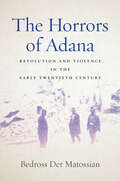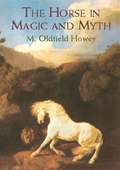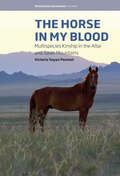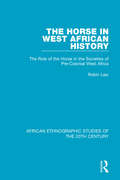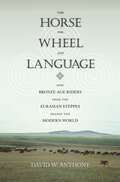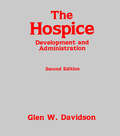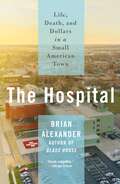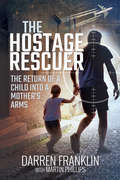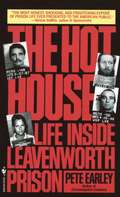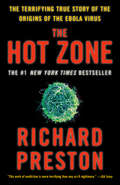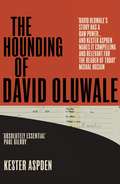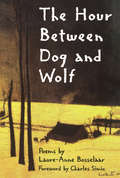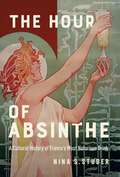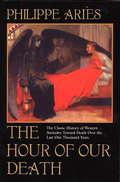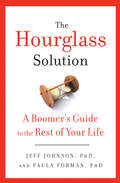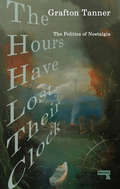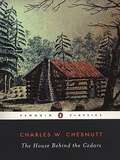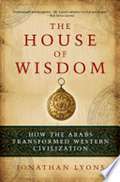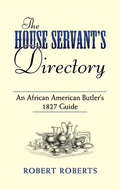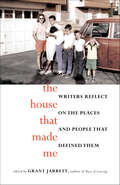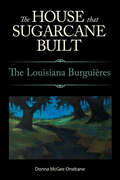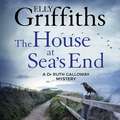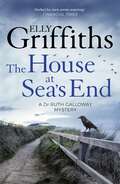- Table View
- List View
The Horror of Police
by Travis LinnemannUnmasks the horrors of a social order reproduced and maintained by the violence of police Year after year the crisis churns: graft and corruption, violence and murder, riot cops and armored vehicles claim city streets. Despite promises of reform, police operate with impunity, unaccountable to law. In The Horror of Police, Travis Linnemann asks why, with this open record of violence and corruption, policing remains for so many the best, perhaps only means of security in an insecure world. Drawing on the language and texts of horror fiction, Linnemann recasts the police not only as self-proclaimed &“monster fighters&” but as monsters themselves, a terrifying force set loose in the world. Purposefully misreading a collection of everyday police stories (TV cop dramas, detective fiction, news media accounts, the direct words of police) not as morality tales of innocence avenged and order restored but as horror, Linnemann reveals the monstrous violence at the heart of liberal social order. The Horror of Police shows that police violence is not a deviation but rather a deliberate and permanent fixture of U.S. &“law and order.&” Only when viewed through the refracted motif of horror stories, Linnemann argues, can we begin to reckon the limits of police and imagine a world without them.
The Horrors of Adana: Revolution and Violence in the Early Twentieth Century
by Bedross Der MatossianIn April 1909, two waves of massacres shook the province of Adana, located in the southern Anatolia region of modern-day Turkey, killing more than 20,000 Armenians and 2,000 Muslims. The central Ottoman government failed to prosecute the main culprits, a miscarriage of justice that would have repercussions for years to come. Despite the significance of these events and the extent of violence and destruction, the Adana Massacres are often left out of historical narratives. The Horrors of Adana offers one of the first close examinations of these events, analyzing sociopolitical and economic transformations that culminated in a cataclysm of violence. Bedross Der Matossian provides voice and agency to all involved in the massacres—perpetrators, victims, and bystanders. Drawing on primary sources in a dozen languages, he develops an interdisciplinary approach to understand the rumors and emotions, public spheres and humanitarian interventions that together informed this complex event. Ultimately, through consideration of the Adana Massacres in micro-historical detail, this book offers an important macrocosmic understanding of ethnic violence, illuminating how and why ordinary people can become perpetrators.
The Horse in Magic and Myth
by M. Oldfield HoweyFrom Pegasus and the Trojan horse to the four horses of the Apocalypse, the familiar figure of the horse possesses an age-old mystique. Indeed, many cultures around the world attribute otherworldly qualities to the horse. This volume provides a rich compilation of legend and lore celebrating the sacred and magical symbolism traditionally associated with horses.Derived from classical mythology, the Bible, world folklore, literature, and other sources, these fantastic tales recount the exploits of angelic steeds and demonic horses as well as centaurs, hippogryphs, and unicorns. Supernatural warhorses and headless phantom horses gallop through these stories, in addition to fairy horses, sea horses, hobbyhorses, bridal horses, corn-horses, moon-horses, wind-horses, and many other fabulous equine exemplars. Readers will also find legends of the gods and patron saints of horses, the horse and metempsychosis, the horse in creation myths, and much more.A bibliography appears at the end of each chapter, providing scholars and folklorists with an excellent range of resources. The informal and colorful narrative, enhanced by several fanciful illustrations, makes this unique book a treat for horse lovers and readers of all interests.
The Horse in My Blood: Multispecies Kinship in the Altai and Saian Mountains (Interspecies Encounters #4)
by Victoria Soyan PeemotA fascinating interspecies relationship can be seen among the horse breeding pastoralists in the Altai and Saian Mountains of Inner Asia. Victoria Soyan Peemot herself grew up in a community with close human-horse relationships and uses her knowledge of the local language and horsemanship practices. Building upon Indigenous research epistemologies, she engages with the study of how the human-horse relationships interact with each other, experience injustices and develop resilience strategies as multispecies unions.
The Horse in West African History: The Role of the Horse in the Societies of Pre-Colonial West Africa
by Robin LawOriginally published in 1980 and here re-issued with an updated preface, this book deals with the role of the horse in the societies of West Africa during the pre-colonial period. It traces the history of its introduction and its diffusion within West Africa, and examines the problems of maintaining horses in such a harsh environment. The use of horses in warfare in analysed but the non-military aspects of the West African horse culture are also discussed, principally the use of horses as tokens of status and wealth. The book includes a review of the decline of the West African horse culture in the 20th century, reflecting the passing of a political system based on warfare and slavery.
The Horse, the Wheel, and Language: How Bronze-Age Riders from the Eurasian Steppes Shaped the Modern World
by David W. AnthonyRoughly half the world's population speaks languages derived from a shared linguistic source known as Proto-Indo-European. But who were the early speakers of this ancient mother tongue, and how did they manage to spread it around the globe? Until now their identity has remained a tantalizing mystery to linguists, archaeologists, and even Nazis seeking the roots of the Aryan race. The Horse, the Wheel, and Language lifts the veil that has long shrouded these original Indo-European speakers, and reveals how their domestication of horses and use of the wheel spread language and transformed civilization. Linking prehistoric archaeological remains with the development of language, David Anthony identifies the prehistoric peoples of central Eurasia's steppe grasslands as the original speakers of Proto-Indo-European, and shows how their innovative use of the ox wagon, horseback riding, and the warrior's chariot turned the Eurasian steppes into a thriving transcontinental corridor of communication, commerce, and cultural exchange. He explains how they spread their traditions and gave rise to important advances in copper mining, warfare, and patron-client political institutions, thereby ushering in an era of vibrant social change. Anthony also describes his fascinating discovery of how the wear from bits on ancient horse teeth reveals the origins of horseback riding. The Horse, the Wheel, and Language solves a puzzle that has vexed scholars for two centuries--the source of the Indo-European languages and English--and recovers a magnificent and influential civilization from the past.
The Hospice: Development and Administration (Death Education, Aging and Health Care)
by Glen W. DavidsonFirst published in 1985. Routledge is an imprint of Taylor & Francis, an informa company.
The Hospital: Life, Death, and Dollars in a Small American Town
by Brian AlexanderUSA Today's 5 BOOKS NOT TO MISS | The Washington Post's 10 BOOKS TO READ IN MARCH | Fortune's 11 BOOKS TO READ IN MARCH"Takes readers into the world of the American medical industry in a way no book has done before....details how we’ve created the dilemma we’re in." —Fortune"With his signature gut-punching prose, Alexander breaks our hearts as he opens our eyes to America’s deep-rooted sickness and despair by immersing us in the lives of a small town hospital and the people it serves." —Beth Macy, bestselling author of Dopesick An intimate, heart wrenching portrait of one small hospital that reveals the magnitude of America’s health care crises.By following the struggle for survival of one small-town hospital, and the patients who walk, or are carried, through its doors, The Hospital takes readers into the world of the American medical industry in a way no book has done before. Americans are dying sooner, and living in poorer health. Alexander argues that no plan will solve America’s health crisis until the deeper causes of that crisis are addressed. Bryan, Ohio's hospital, is losing money, making it vulnerable to big health systems seeking domination and Phil Ennen, CEO, has been fighting to preserve its independence. Meanwhile, Bryan, a town of 8,500 people in Ohio’s northwest corner, is still trying to recover from the Great Recession. As local leaders struggle to address the town’s problems, and the hospital fights for its life amid a rapidly consolidating medical and hospital industry, a 39-year-old diabetic literally fights for his limbs, and a 55-year-old contractor lies dying in the emergency room. With these and other stories, Alexander strips away the wonkiness of policy to reveal Americans’ struggle for health against a powerful system that’s stacked against them, but yet so fragile it blows apart when the pandemic hits. Culminating with COVID-19, this book offers a blueprint for how we created the crisis we're in.
The Hostage Rescuer: The Return of a Child into a Mother's Arms
by Martin Phillips Darren FranklinThe gripping true crime story of a child abducted by his father from his mother, and the international race to rescue him against dangerous odds.Two close encounters with death convince Darren Franklin that his career in global private security is not the healthiest. Meanwhile Scottish nurse Diane is on a life-changing journey of her own after a Shirley Valentine-style romance on a Greek holiday island. As she moves to Australia to marry her Greek lover and start a family, Darren escapes a contract on his life and teams up with a former British special forces operative to get into the business of rescuing abducted children. Then Darren’s and Diane’s paths cross. After Diane’s marriage breaks down, her ex takes their four-year-old son Theo back to the Greek islands, and, when all attempts to get her son back via the courts have failed, Darren’s company is called in to get him back. As Diane waits anxiously in the wings, Darren and his small team must contend with hostile locals, double-crossing police, and dubious legal contacts to conduct surveillance on their target, formulate a plan, and grab the boy before making their hazardous escape. They can trust no one. A whole island community is against them, they have their suspicions about their own lawyer, and the charity go-between on their team is actively leaking details of their plans, risking their mission, and possibly their lives. Set against an epidemic of parental abductions, and a background of frequent failed recoveries, the action swings from Britain to South America to Australia, to the USA and the Greek Islands on a dramatic, emotional roller coaster from start to finish.
The Hostage Rescuer: The Return of a Child into a Mother's Arms
by Martin Phillips Darren FranklinThe gripping true crime story of a child abducted by his father from his mother, and the international race to rescue him against dangerous odds.Two close encounters with death convince Darren Franklin that his career in global private security is not the healthiest. Meanwhile Scottish nurse Diane is on a life-changing journey of her own after a Shirley Valentine-style romance on a Greek holiday island. As she moves to Australia to marry her Greek lover and start a family, Darren escapes a contract on his life and teams up with a former British special forces operative to get into the business of rescuing abducted children. Then Darren’s and Diane’s paths cross. After Diane’s marriage breaks down, her ex takes their four-year-old son Theo back to the Greek islands, and, when all attempts to get her son back via the courts have failed, Darren’s company is called in to get him back. As Diane waits anxiously in the wings, Darren and his small team must contend with hostile locals, double-crossing police, and dubious legal contacts to conduct surveillance on their target, formulate a plan, and grab the boy before making their hazardous escape. They can trust no one. A whole island community is against them, they have their suspicions about their own lawyer, and the charity go-between on their team is actively leaking details of their plans, risking their mission, and possibly their lives. Set against an epidemic of parental abductions, and a background of frequent failed recoveries, the action swings from Britain to South America to Australia, to the USA and the Greek Islands on a dramatic, emotional roller coaster from start to finish.
The Hot House: Life Inside Leavenworth Prison
by Pete EarleyAn explosive eyewitness portrait of life inside the nations' most notorious maximum security prison by the author of "Family of Spies". Earley spent two years inside Leavenworth-- the infamous penitentiary that is home to 1,400 of the nation's most dangerous criminals -- to write this gripping, critically acclaimed investigative report.
The Hot Zone: The Terrifying True Story of the Origins of the Ebola Virus (Large Print Bks.)
by Richard PrestonThe bestselling landmark account of the first emergence of the Ebola virus. Now a mini-series drama starring Julianna Margulies, Topher Grace, Liam Cunningham, James D'Arcy, and Noah Emmerich on National Geographic.A highly infectious, deadly virus from the central African rain forest suddenly appears in the suburbs of Washington, D.C. There is no cure. In a few days 90 percent of its victims are dead. A secret military SWAT team of soldiers and scientists is mobilized to stop the outbreak of this exotic "hot" virus. The Hot Zone tells this dramatic story, giving a hair-raising account of the appearance of rare and lethal viruses and their "crashes" into the human race. Shocking, frightening, and impossible to ignore, The Hot Zone proves that truth really is scarier than fiction.
The Hounding of David Oluwale
by Kester Aspden'David Oluwale's story has a raw power...and Kester Aspden makes it relevant for the reader of today' Mishal HusainAn award-winning microhistory that examines the death of David Oluwale and institutionalised police racism in Britain.When, in May 1969, the body of David Oluwale was found in the River Aire near Leeds, few questions were asked about the circumstances of his death. Oluwale was homeless and had spent time in a psychiatric hospital, an immigrant from Nigeria who was trapped in a system that had failed him miserably.Eighteen months later a lengthy campaign of harassment by two Leeds policemen was uncovered - Oluwale became national news in Britain, and a symbol for its black community. This extraordinary book draws on original archival material only recently released to revisit one of the most chilling crimes in British history, and at the same time raises questions as relevant today as they were at the end of the sixties.Winner of the CWA Gold Dagger for Non-Fiction 2008'Aspden's painstaking research, empathetic approach and ability to weave together a vivid wider social critique show Oluwale was done a terrible disservice' Metro
The Hour Between Dog and Wolf (New Poets of America)
by Laure-Anne BosselaarLaure-Anne Bosselaar's poetry captures the lives of "lost souls roaming"--be they young girls in convents, merchants, whores, widows, soldiers. Old Europe still lives in Bosselaar's rich language: Entre chien et loup, as it's known in Flanders--the time at dusk when a wolf can be mistaken for a dog.
The Hour of Absinthe: A Cultural History of France's Most Notorious Drink (Intoxicating Histories #11)
by Nina S. StuderAt the height of its popularity in the late nineteenth century, absinthe reigned in the bars, cafés, and restaurants of France and its colonial empire. Yet by the time it was banned in 1915, the famous green fairy had become the green peril, feared for its connection with declining birth rates and its apparent capacity to induce degeneration, madness, and murderous rage in its consumers.As one of history’s most notorious drinks, absinthe has been the subject of myth, scandal, and controversy. The Hour of Absinthe explores how this mythologizing led to the creation and fabrication of a vast modern folklore while key historical events, crucial to understanding the story of absinthe, have been neglected or unreported. Mystique and moralizing both arose from the spirit’s relationship with empire. Some claim that French soldiers were given daily absinthe rations during France’s military conquest of Algeria to protect them against heat, diseases, and contaminated water. In fact, the overenthusiastic adoption of the drink by these soldiers, and subsequently by French settlers, was perceived as a threat to France’s colonial ambitions – an anxiety that migrated into French medicine.Providing keen insight into how local cultural narratives about absinthe shaped what quickly became a global reputation, Nina Studer provides a panoptic view of the French Empire’s influence on absinthe’s spectacular fall from grace.
The Hour of Our Death
by Philippe AriesThis remarkable book--the fruit of almost two decades of study--traces in compelling fashion the changes in Western attitudes toward death and dying from the earliest Christian times to the present day. A truly landmark study, The Hour of Our Death reveals a pattern of gradually developing evolutionary stages in our perceptions of life in relation to death, each stage representing a virtual redefinition of human nature.Starting at the very foundations of Western culture, the eminent historian Phillipe Ariès shows how, from Graeco-Roman times through the first ten centuries of the Common Era, death was too common to be frightening; each life was quietly subordinated to the community, which paid its respects and then moved on. Ariès identifies the first major shift in attitude with the turn of the eleventh century when a sense of individuality began to rise and with it, profound consequences: death no longer meant merely the weakening of community, but rather the destruction of self. Hence the growing fear of the afterlife, new conceptions of the Last Judgment, and the first attempts (by Masses and other rituals) to guarantee a better life in the next world. In the 1500s attention shifted from the demise of the self to that of the loved one (as family supplants community), and by the nineteenth century death comes to be viewed as simply a staging post toward reunion in the hereafter. Finally, Ariès shows why death has become such an unendurable truth in our own century--how it has been nearly banished from our daily lives--and points out what may be done to "re-tame" this secret terror.The richness of Ariès's source material and investigative work is breathtaking. While exploring everything from churches, religious rituals, and graveyards (with their often macabre headstones and monuments), to wills and testaments, love letters, literature, paintings, diaries, town plans, crime and sanitation reports, and grave robbing complaints, Aries ranges across Europe to Russia on the one hand and to England and America on the other. As he sorts out the tangled mysteries of our accumulated terrors and beliefs, we come to understand the history--indeed the pathology--of our intellectual and psychological tensions in the face of death.
The Hourglass Solution: A Boomer's Guide to the Rest of Your Life
by Jeff Johnson Paula FormanSeventy-five million baby boomers are finding themselves bound by habits and pursuits instigated many years ago-and for a large percentage of those boomers, significant aspects of their lives no longer satisfy. But by joining revolutionary insight to highly proprietary prescriptive advice, The Hourglass Solution provides a proactive and pragmatic way to lead a better life after 50. Johnson and Forman evaluate the life narrative through the lens of an hourglass-proposing that those in early adulthood are at the top of the hourglass, able to select from many options, while those in middle age are in the hourglass’s neck, constrained by the choices they made earlier in their lives. The Hourglass Solution explains how those approaching their fifties (and beyond) can still find a wealth of opportunity by recognizing and pursuing new directions, free from the restrictions imposed by an earlier choice. Like Gail Sheehy’s Passages before it, The Hourglass Solution will enlighten and inspire a generation of readers to regain control over their lives and well-being.
The Hours Have Lost Their Clock: The Politics of Nostalgia
by Grafton TannerThe Hours Have Lost Their Clock charts the rise of nostalgia in an era knocked out of time.In The Hours Have Lost Their Clock, Grafton Tanner charts the rise of nostalgia in an era knocked out of time. Nostalgia is the defining emotion of our age. Political leaders promise a return to yesteryear. Old movies are remade and cancelled series are rebooted. Veterans reenact past wars, while the displaced across the world long for home. But who is behind this collective ache for a home in the past? Do we need to eliminate nostalgia, or just cultivate it better? And what is at stake if we make the wrong choice? Moving from the fight over Confederate monuments to the birth of homeland security to the mourning of species extinction, Grafton Tanner traces nostalgia&’s ascent in the twenty-first century, revealing its power as both a consequence of our unstable time and a defense against it. With little faith in a future of climate change and economic anxiety, many have turned to nostalgia to weather the present, while powerful elites exploit it for their own gain. An exploration into the politics of loss and yearning, The Hours Have Lost Their Clock is an urgent call to take nostalgia seriously. The very future depends on it.
The House Behind the Cedars
by Charles W. Chesnutt Donald B. GibsonAn early masterwork among American literary treatments of miscegenation, Chesnutt's story is of two young African Americans who decide to pass for white in order to claim their share of the American dream.
The House Of Wisdom: How The Arabs Transformed Western Civilization
by Jonathan LyonsFor centuries following the fall of Rome, Western Europe was a benighted backwater, a world of subsistence farming, minimal literacy, and violent conflict. Meanwhile Arab culture was thriving, dazzling those Europeans fortunate enough to visit cities like Baghdad or Antioch. There, philosophers, mathematicians, and astronomers were steadily advancing the frontiers of knowledge, as well as keeping alive the works of Plato and Aristotle. When the best libraries in Europe held several dozen books, Baghdad's great library, The House of Wisdom, housed four hundred thousand. Jonathan Lyons shows just how much "Western" ideas owe to the Golden Age of Arab civilization. Even while their countrymen waged bloody Crusades against Muslims, a handful of intrepid Christian scholars, hungry for knowledge, traveled East and returned with priceless jewels of science, medicine, and philosophy that laid the foundation for the Renaissance. In this brilliant, evocative book Jonathan Lyons reveals the story of how Europe drank from the well of Muslim learning.
The House Servant's Directory: An African American Butler's 1827 Guide (American Antiquarian Cookbook Collection)
by Robert Roberts"In order to get through your work in proper time, you should make it your chief study to rise early in the morning; for an hour before the family rises is worth more to you than two after they are up."So begins Robert Roberts' The House Servant's Directory, first published in 1827 and the standard for household management for decades afterward. A classic survey of work, home life, and race relations in early America, the book was the result of many years of Roberts' personal and professional experiences. One of the first books written by an African-American and published by a commercial press, this manual for butlers and waiters offers keen insight into the social milieu, hierarchy, and maintenance of the antebellum manor.As a servant to a prominent New England family, Roberts provided valuable insights into what was expected of domestic servants. His book contains an abundance of instructions for successfully completing household chores as well as suggestions for properly cleaning furniture and clothing; and for buying, preparing, and serving food and drink for dinner parties of all sizes (much of which is still useful information today). The text also contains suggestions for arranging servants' work routines, and advice to heads of families on how best to manage their domestic help -- extraordinary recommendations for master-servant relationships and highly unusual for the time.Among the most famous of etiquette books to provide instruction on proper behavior for domestic servants in the early nineteenth century, Roberts' Directory remains a critical primary source in sociology and African-American history.
The House That Made Me: Writers Reflect on the Places and People that Defined Them
by Grant JarrettHome—the place where we were born, where we learned our first lessons, where family was defined. The very notion evokes powerful feelings, feelings as individual as our fingerprints, as enduring as the universe and as inescapable as gravity. In this candid, evocative collection of essays, a diverse group of acclaimed authors reflects on the diverse homes, neighborhoods, and experiences that helped shape them—using Google Earth software to revisit the location in the process. Moving and life-affirming, this poignant anthology gives fresh insight into the concept of Home. This anthology includes 19 essays by an array of diverse award-winning authors, including: • Tim Johnston, author of Descent and winner of the O. Henry Prize, the New Letters Award for Writers, and the Gival Press Short Story Award • Laura Miller, culture columnist at Slate and co-founder of Salon.com • Porochista Khakpour, author of The Last Illusion and recipient of the 2012 National Endowment for the Arts (NEA) Literature Fellowship in Creative Writing (Prose) • Lee Upton, author of The Tao of Humiliation, named one of “Best Books of 2014” by Kirkus Reviews • Pamela Erens, author of the critically acclaimed novel The Virgins • Jeffery Renard Allen, author of Song of the Shank and winner of the Ernest J. Gaines Award for Literary Excellence and the Whiting Writer's Award
The House That Sugarcane Built: The Louisiana Burguières
by Donna McGee OnebaneThe House That Sugarcane Built tells the saga of Jules M. Burguières Sr. and five generations of Louisianans who, after the Civil War, established a sugar empire that has survived into the present. When twenty-seven-year-old Parisian immigrant Eugène D. Burguières landed at the Port of New Orleans in 1831, one of the oldest Louisiana dynasties began. Seen through the lens of one family, this book traces the Burguières from seventeenth-century France, to nineteenth- century New Orleans and rural south Louisiana and into the twenty-first century. It is also a rich portrait of an American region that has retained its vibrant French culture. As the sweeping narrative of the clan unfolds, so does the story of their family-owned sugar business, the J. M. Burguières Company, as it plays a pivotal role in the expansion of the sugar industry in Louisiana, Florida, and Cuba. The French Burguières were visionaries who knew the value of land and its bountiful resources. The fertile soil along the bayous and wetlands of south Louisiana bestowed on them an abundance of sugarcane above its surface, and salt, oil, and gas beneath. Ever in pursuit of land, the Burguières expanded their holdings to include the vast swamps of the Florida Everglades; then, in 2004, they turned their sights to cattle ranches on the great frontier of west Texas. Finally, integral to the story are the complex dynamics and tensions inherent in this family-owned company, revealing both failures and victories in its history of more than 135 years. The J. M. Burguières Company's survival has depended upon each generation safeguarding and nourishing a legacy for the next.
The House at Sea's End: The Dr Ruth Galloway Mysteries 3 (The Dr Ruth Galloway Mysteries #3)
by Elly GriffithsWNNER OF THE 2016 CWA DAGGER IN THE LIBRARY. The shadow of the Second World War looms dark over the third chilling mystery for Dr Ruth Galloway. Some buried secrets shouldn't be uncovered.'A melancholy setting, an eerie discovery, a lone investigator... perfect for the long winter evening' Financial TimesDr Ruth Galloway is called in by a team of archaeologists investigating coastal erosion on the north Norfolk coast, when they unearth six bodies buried at the foot of a cliff. They seem to have been there a very long time. Ruth must help discover how long, and how on earth they got there. Ruth and DCI Nelson are drawn together once more to unravel the past. Tests reveal that the bodies have lain, preserved in the sand, for sixty years. The mystery of their deaths stretches back to the Second World War, a time when Great Britain was threatened by invasion. Ruth thought she knew the history of Norfolk - she's about to find out just how wrong she was, and how far someone will go to keep their secrets buried.
The House at Sea's End: The Dr Ruth Galloway Mysteries 3 (The Dr Ruth Galloway Mysteries #3)
by Elly GriffithsThe shadow of the Second World War looms dark over this chilling mystery starring forensic archaeologist Dr Ruth Galloway. Some buried secrets shouldn't be uncovered.'Brilliant on the eerie landscape of the Norfolk coast' Sunday TimesDr Ruth Galloway is called in by a team of archaeologists investigating coastal erosion on the north Norfolk coast, when they unearth six bodies buried at the foot of a cliff. They seem to have been there a very long time. Ruth must help discover how long, and how on earth they got there. Ruth and DCI Nelson are drawn together once more to unravel the past. Tests reveal that the bodies have lain, preserved in the sand, for sixty years. The mystery of their deaths stretches back to the Second World War, a time when Great Britain was threatened by invasion. Ruth thought she knew the history of Norfolk - she's about to find out just how wrong she was, and how far someone will go to keep their secrets buried.

